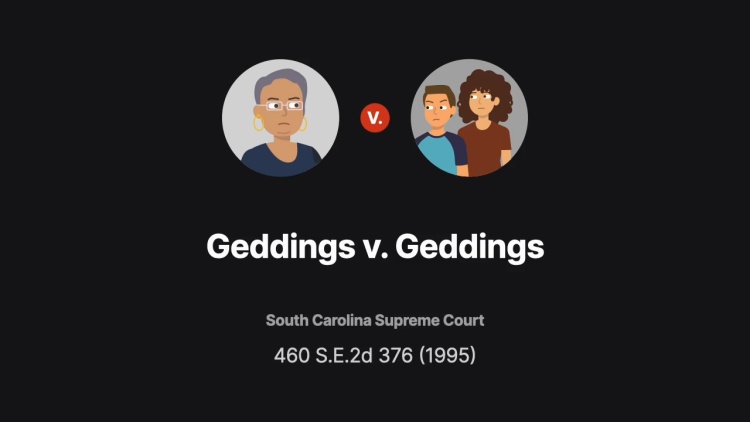Geddings v. Geddings
South Carolina Supreme Court
319 S.C. 213, 460 S.E.2d 376 (1995)
- Written by Mary Pfotenhauer, JD
Facts
When Pinkie Geddings (plaintiff) married Marvin Geddings, both had children from previous marriages. Almost 10 years into their marriage, Marvin and Pinkie signed an agreement acknowledging that each spouse had executed a will and intended for most of his or her property to pass to his or her respective children upon death. To effectuate that intent, each spouse also expressly disclaimed any interest in the other spouse’s estate except as provided for in the respective wills. The agreement stated that each spouse had made a full and fair disclosure of his or her assets to the other spouse before the agreement’s execution. After Marvin’s death, Pinkie filed suit against Marvin’s children (defendants), both individually and as representatives of Marvin’s estate, invoking her right to receive an elective share of Marvin’s estate. The children argued that Pinkie waived her right to receive an elective share when she executed the earlier agreement. However, Pinkie countered that the purported waiver was void because she executed it without receiving the statutorily required fair disclosure of Marvin’s assets. At a hearing, evidence showed that Marvin was secretive about financial matters and that the attorney who drafted the agreement did not discuss Marvin’s assets with Pinkie. The probate judge determined that despite the agreement’s statement that the spouses each received a full and fair disclosure, Pinkie did not in fact receive such a disclosure before the agreement’s execution. The purported waiver was therefore found to be void, and the judge awarded Pinkie an elective share of Marvin’s estate. The circuit court affirmed, and the children appealed to the South Carolina Supreme Court.
Rule of Law
Issue
Holding and Reasoning (Finney, C.J.)
What to do next…
Here's why 907,000 law students have relied on our case briefs:
- Written by law professors and practitioners, not other law students. 47,100 briefs, keyed to 996 casebooks. Top-notch customer support.
- The right amount of information, includes the facts, issues, rule of law, holding and reasoning, and any concurrences and dissents.
- Access in your classes, works on your mobile and tablet. Massive library of related video lessons and high quality multiple-choice questions.
- Easy to use, uniform format for every case brief. Written in plain English, not in legalese. Our briefs summarize and simplify; they don’t just repeat the court’s language.





